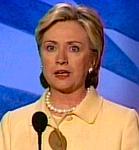2006年VOA标准英语-US Lawmakers Debate Security, Iraq, Terrorism,(在线收听)
By Dan Robinson
Washington
08 September 2006
As the fifth anniversary of the September 11, 2001 terrorist attacks approaches, Republicans and Democrats continue to trade words over Bush administration policies in Iraq, the fight against radical Islamist terrorism, and homeland security. From Capitol Hill, VOA's Dan Robinson reports, members of Congress seeking re-election in November have drawn clear battle lines, as President Bush presses Congress to pass key security-related legislation.
--------
For the third time in two days, opposition Democrats used news conferences on Capitol Hill to lay out what they call their security agenda, policies they hope will persuade Americans to vote them back into power in Congress.
Among other things, Democrats pledge that if Americans return them to power in the House and Senate in November, they will implement all of the recommendations of the independent September 11 Commission, and bring a more competent approach to protecting against terrorism.
 Hillary Clinton (file photo) |
||
While she has been among the sharpest critics of President Bush on Iraq, and homeland security, Senator Clinton urges a bipartisan effort with Republicans.
Another potential contender for the White House in 2008, Democratic Senator Joseph Biden took a stronger approach in a speech at the National Press Club where he took aim at President Bush's post-9/11 policy of pre-emption. "Real security comes from prevention, not preemption. And that working with strong partners is better than alienating our partners," he said.
Key Democratic leaders, such as Senate Minority Leader Harry Reid, say a series of speeches by President Bush in advance of September 11 observances, are politically-motivated.
For their part, Republicans make clear they don't intend to let Democrats steal the spotlight when it comes to Iraq, terrorist threats, and security, some of the key issues on which the November election is likely to be decided.
In throwing down a challenge of their own this week, Republicans turned to border security, which they assert has improved under their watch.
But they also know that continuing critical gaps in securing U.S. borders make the country vulnerable to potential new terrorist attacks, and leave them open to Democratic attacks.
House Republicans vow to pass new border security and immigration-related legislation before the end of September, when lawmakers are due to leave to campaign for the November election.
Dennis Hastert is the Republican House Speaker:
"We have a million people coming across that border every year, undocumented, going around the checkpoints, we don't know who they are, what they are carrying on their backs, or what their purpose is," he said.
There is a problem of course, which is that members of President Bush's Republican party have been seriously split over how to move forward in reforming the nation's immigration system.
House Republicans say they are consulting with the Senate, where bipartisan legislation providing for a guest worker program and path to citizenship has won the support of President Bush, but contrasts sharply with a House-passed bill.
Republican Congresswoman Deborah Pryce and fellow Republican Roy Blunt, addressed that rift:
PRYCE: The American people are starting to realize that there is a big difference between the product the House produced way back last December, and the product that the Senate produced, and there is a vast range of difference to work with.
BLUNT: Frankly, our friends on the Senate side are beginning to appreciate the fact that the American people not only appreciate that difference but understand why the House position to secure the border first has made the most sense.
House Minority Leader Nancy Pelosi is waiting to see what emerges from the Republicans, but sees no broad immigration reform on the horizon. "There is not going to be any comprehensive, bipartisan immigration bill unless the president of the United States weighs in, unless he exerts his leadership to do which he has advocated for, but which he has not been able to persuade his party to do," she said
Continuing a series of pre-September 11 anniversary speeches, President Bush again urged Congress to approve legislation that would establish guidelines to enable terrorist suspects to be tried before military courts, and provide firmer legal basis for an electronic surveillance program he says is vital to track down potential terrorists before they can strike.